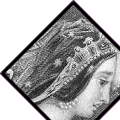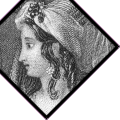





The poem in which a Malay steals a pearl has also earned mixed commentary. Some suggest it deploys racist stereotypes.
This site suggests that both of these poems, and several others, may be read in new ways if we note Dickinson's interest in and revision of orientalist tropes and images, including those she found in Thomas Moore's Lalla Rookh.
Since Edward Said's work on orientalism as a discourse tied to imperialism, many scholars have noted that images of the orient as exotic, violent and in need of European control served nineteenth-century British foreign policy. More specifically, Nigel Leake suggests that in British oriental narratives "the absorptive pull of the exotic visual image or allusion" is "constantly checked and qualified by a globalizing, descriptive discourse which draws the viewer/reader away from dangerous proximity to the image, in order to inscribe him/her in a position of epistemological power; nothing other than the commanding vision of imperialist objectivity" (168).
One might check this assertion by looking closely at the illustrations for Lalla Rookh and by considering the possibility that Dickinson's use of oriental tropes does not inscribe the reader in a position of "imperialist objectivity." This site opens up the possibility that by using the orient to write about ecstasy, Dickinson forges a deep link between politics and desire. In situating ecstasy in the east and thus in a larger political context, Dickinson attempts not to master the erotic by writing it into a discourse of imperialist objectivity, but rather to suggest that passion may have an untamable revolutionary power.
For Dickinson, the east is a place where the erotic cannot be converted or exorcised, cannot be made to serve established religions or hierarchies. In "He touched me" to be ravished is to be like a “Persian, baffled at her shrine.” At least twice India figures desire: in one poem the speaker yearns for a "moment of Brocade--My--drop--of India”; and in another desire is stolen when a "Malay--took the Pearl". Dickinson was not the only writer to thus imagine the east. In a wild, passionate letter to Nathaniel Hawthorne during their brief but intense friendship, Melville tells the older writer, "you have now given me the crown of India." For some critics, this is corroborating evidence of Melville’s expansionist inclinations, and akin to Walt Whitman’s eagerness to cast his appropriating gaze across the North American continent. In this context, Dickinson is often understood as a feminine minimalist in contrast to masculine empire-builders. Indeed, her desire for just a "drop--of India" contrasts dramatically with Melville’s exultation upon receiving the "crown of India” from Hawthorne. But such a reading does not do justice to what Melville, Dickinson, and Whitman share when they invoke the east to write of ecstasy. In their versions of the orient, and perhaps in Moore’s romance and the accompanying illustrations, desire is revolutionary.
Critical Issues | Student Projects | Bibliography



